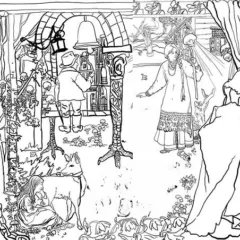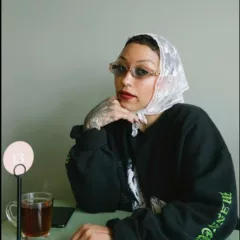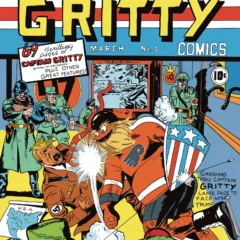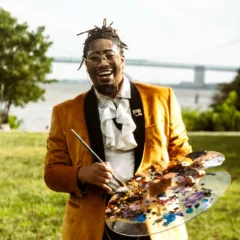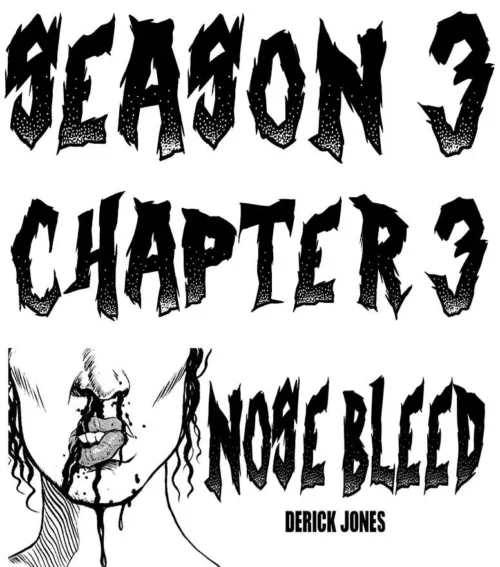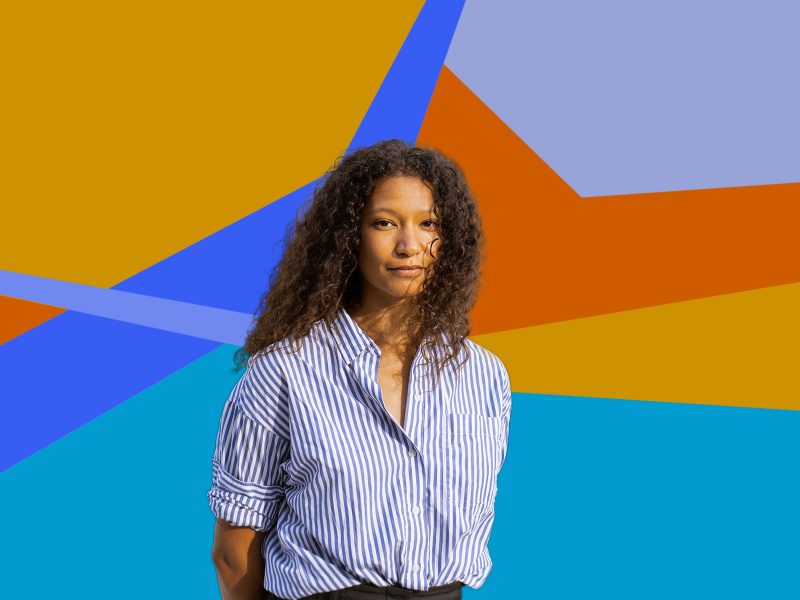
In this 30-minute conversation, Logan Cryer sits speaks with Zoë Rayn Evans, the new Executive Director of University City Arts League. Zoë has always envisioned running an art center- but never expected it to happen this early in her career. Founded in 1967, UCAL has always honored its mission of offering accessible, affordable art programs for people of all ages in the West Philadelphia community. Zoë’s tells Logan about her plans to honor the center’s history– like with the upcoming HOUSE PARTY , a nod to the literal house parties UCAL once would host– and her plan to address the question: “how to not be so accessible that we [UCAL] become inaccessible?” Logan also asks Zoë about founding and serving as creative director of Caldera Magazine (currently embarking on their seventh issue), and her prior arts administration work at Friends of Rail Park and the Penn Museum. It’s a joyful interview with much laughter, between two young pioneering arts leaders in Philadelphia.
You can listen to Artblog Radio on Apple Podcasts and Spotify and many other audio platforms on the web. Thank you to Kyle McKay for composing Artblog Radio’s original podcast intro and outro!
Links
- University City Arts League (UCAL)
- Instagram – @ucartsleague
- Building Futures Gala – Info & Tickets
- Arts League HOUSE PARTY
- Adult Classes
- Youth Classes
Transcription
[00:00:12] Logan Cryer: Hello friends, you are listening to Artblog Radio, recorded in Philadelphia. My name is Logan Cryer, and in this episode, you will hear a conversation with myself and the new Executive Director of University City Arts League, Zoë Rayn Evans. Zoë is a graduate of Temple University where she studied communications and art history.
Her notable projects include the 2016 Democratic National Convention’s “Truth to Power” activation, “An Immigrant Alphabet” public art installation, “(DIS)PLACED Philadelphia,” and “Heritage West: The West Philadelphia Community Archaeology Project.” Most recently, they manage collaborative projects at the University of Pennsylvania, Penn Museum of Archeology and Anthropology, where they led community-driven engagement initiatives.
Zoë has served as the Community Engagement and Programming consultant for Friends of the Rail Park, and is the Founder of Caldera Magazine. Zoë and I began our conversation discussing her educational background and how she was led to become an executive director.
Are you- did you go to school in Chicago? Are you from Chicago?
[00:01:28] Zoë Rayn Evans: No, I went to school here in Philly at Temple, I graduated in 2016, but I followed my partner to Chicago (laughing) when they got a job opportunity there, um, and ended up there for like two years. But I loved it, I did consider or trying to stay permanently, but Philly… Philly’s just where my heart is. So I came running back.
[00:01:51] Logan Cryer: I literally heard someone describe recently– well, they were describing that someone has said to them– that Philly is like a vortex. And like, once you’re here it’s hard to leave. (laughs)
[00:02:02] Zoë Rayn Evans: Yeah. Once you realize you’re a Philly person, it’s kind of over for you in like a good way. (laughs) It’s definitely, definitely a specific group of people that need to be in Philly.
[00:02:14] Logan Cryer: Yeah, definitely. What did you study at Temple?
[00:02:19] Zoë Rayn Evans: I did communications and art history.
[00:02:22] Logan Cryer: As a double major?
[00:02:24] Zoë Rayn Evans: Yeah, I would have… or, well, I have to- I will out myself. I was a communications major and I was supposed to be an art history double major, but I didn’t finish the language requirement (laughing) so they gave me a minor instead.. So technically not a double. I say double because I did all the work. I just didn’t finish French.
[00:02:47] Logan Cryer: (laughs) You have the knowledge of a double major!
[00:02:52] Zoë Rayn Evans: Exactly.
[00:02:53] Logan Cryer: How did you get in? That’s an interesting combo. How did you get into art history? I’m guessing communications came first.
[00:03:01] Zoë Rayn Evans: Yeah, well, technically it was actually opposite. I transferred to Temple. I went to Seton Hill University first, for a year, and I was a dance major there. And my parents were like, “can you please do something real? Can you please reconsider?” (laughs) “… this is not going to be a long-term thing. Like, please try again.”
And so when I transferred to Temple, I was like, “well, art history, like, that’s real, I’ll do that instead” (laughs). And, turns out that also proved to be a very challenging career, uh, or has very challenging career options. So then I added communications and the mix because I thought I wanted to be an art director or something like that, to like marry, more of like an editorial art practice, or along those lines.
But I definitely ended up in nonprofit space through, through that learning experience.
[00:03:52] Logan Cryer: That was actually something I was going to ask, if you have kind of always envisioned yourself eventually becoming an executive director of an organization?
[00:04:02] Zoë Rayn Evans: Yeah. This, I definitely didn’t think it would happen this soon, which is exciting and kind of crazy. I do have to pinch myself some mornings when I’m like opening up the center. But I, it has always been my long-term goal to open my own art center. So to be able to actually be in a leadership position in a community minded space in the neighborhood that I also live in, has complete dream.
[00:04:30] Logan Cryer: Yeah. For University City Arts League, when did you find out about them? What was your introduction to them?
[00:04:37] Zoë Rayn Evans: Yeah. I had previously been aware of the organization, um, I was working at Al Bustan Seeds of Culture for a little bit, and we offered drumming classes that were actually hosted at the Arts League, so I was familiar with the space. Not necessarily, like, the wealth of programs that they offered, but I was aware that they existed and that they were very much like a community space and center over here.
And when I was finishing up my time at the Penn Museum and actively looking for other work, when I saw this job posting, I got very excited because we had just purchased a house over here, and it just felt like perfect timing to pursue this, this leg of my long-term dreams in the arts world.
[00:05:22] Logan Cryer: Yeah, that’s very like, things coming together… right place, right time.
[00:05:27] Zoë Rayn Evans: Yeah. Yeah. For sure.
[00:05:29] Logan Cryer: Do you find that generally, as you’ve moved through your… I’m going to call it “arts admin,” but you could also call it, I don’t know, “arts leadership,” or I don’t know how you would define it… But as you moved through your career, do you find that you’re kind of just going with the flow and things kind of turn out or are you more kind of like, “here’s my plan, here’s my goals, this is what I do.”
[00:05:55] Zoë Rayn Evans: It’s a little bit of both, but I definitely consider myself, like a tried and true arts administrator, for sure, and I wouldn’t call myself an artist. With Caldera, maybe like “publishing as practice,” like could be something to consider or explore, but I think by and large, I’m definitely just a career arts administrator, um, and enthusiast; supporter of the arts.
I’m also a planner by nature, so I definitely… go with the flow in the sense that, if something doesn’t feel right, or it doesn’t feel conducive to my larger goals, I will throw in the towel and move right along. Happy to do that, have no shame in saying “this isn’t it” and moving right along. But I definitely have like longer plans and goals for my career.
[00:06:42] Logan Cryer: Mmm. And then for University City Arts League, which I definitely want to talk about because you are the new Director, and so I know people might want to know, like, “what is your vision?” and “what are your goals?” and everything like that, um, but, before I get there-
How long exactly have you been working there as that position? I know it’s new, but how long exactly?
[00:07:03] Zoë Rayn Evans: I started… technically, my official start date was the first week of December, but I started kind of loitering around the space in November to get to know staff and like, to get more familiar before I was like really in it. But yeah, I’ve only been there since December.
[00:07:20] Logan Cryer: Okay. Yeah. And do you feel like you have a clear idea of what you’re thinking the future of the organization might be? I think I saw somewhere online, where– maybe on the website– where they described themselves as transitioning? “In a moment of transition.”
[00:07:36] Zoë Rayn Evans: Yeah. So there is, there’s a lot to consider. And I think I’m still fresh enough that I don’t have like a set kind of, vision or map for the organization just yet. Um, I’m in a lot of conversation with staff and teaching artists and artists that have been in the community for a long time. In case people aren’t aware, the Arts League was founded in 1967.
So there’s like, a long standing community of artists in the neighborhood, um, that have been huge proponents of, kind of the growth over the years. And right now I think like the biggest things we’re trying to, to figure out and investigate are, how to not be so accessible that we become inaccessible? Which is something that we’re finding with our programs…
[00:08:24] Logan Cryer: could you talk about that a little bit more? That sounds really interesting.
[00:08:29] Zoë Rayn Evans: Yeah. It’s… Our programs have historically been incredibly affordable. There have always been payment plan options, we kind of work with people, just because again, it is a tried and true community space in that sense, because of the immediate area.
I think there are so many families– well this is specifically in regard to our afterschool program… We very quickly reached capacity for the building, um, and we have wait-lists for every class, and it… I mean, it’s an exciting challenge to have because there are a lot of spaces that do not have that, that experience, especially in a, in a COVID world. So we feel incredibly privileged and lucky to even have this as an issue.
But yeah, it’s, more trying to figure out how to offer more of what we are doing at the same prices that we’re offering it at, but our space is physically not able to accommodate that. Uh, the building. It’s an old Victorian twin. It’s four stories tall, and it was converted into an art center when they purchased the building in the eighties.
So it’s, it’s worked for a long time, but we’re quickly approaching an era where we need to figure out what we’re going to do, because we literally don’t have space to, to meet the needs of our community.
[00:09:46] Logan Cryer: Right. And a lot of organizations. That’s when they would say, “well, if we raised the prices, that limits who, you know, the number of people who would come in.” And that’s not really what you all are interested in doing?
[00:09:58] Zoë Rayn Evans: Yeah. There’s like a happy medium and, and a delicate dance to do, and trying to make sure that we’re, obviously pricing things in a way that we’re able to pay teaching staff fair wages- which is something I’ve been very pleasantly surprised to see this coming in to the organization, that that’s been a long standing part of the mission is to actually be a developer of the arts, which means sustaining artists as individuals, outside of just them being educators within the, within the space.
So yeah, there’s a lot to figure out like that. But it’s, it’s definitely a top priority.
[00:10:32] Logan Cryer: So you’ve mentioned that there’s classes and, you mentioned that it can be used as like a host, so people could have events in this space. What are some of the other programs that happen at UCAL currently?
[00:10:46] Zoë Rayn Evans: Yeah, so we… Well pre pandemic, there was a pretty robust rentals program where, again, this being a very accessibly priced space, smaller collectives or artists or smaller organizations that are up and coming, kind of do their programming out of the space. Um, we have an afterschool program, that is Arts Enrichment After School, like Monday through Friday. Then we have adult classes, we have a full ceramic studio with classes for all ages, and then we have a community arts program, but it is in-school residencies, um, with different artists, in predominantly elementary and middle schools. So we have, we have a ton of programs going on in-house and out in the actual neighborhood.
[00:11:30] Logan Cryer: And should there be any kind of expectation that there’s going to be more transitions around what those programs look like or how they function?
[00:11:39] Zoë Rayn Evans: Kind of, I’m trying not to, to change too much of the actual content that we work within. Something I was really attracted to with the Arts League is that they’re kind of naturally a more contemporary leaning art space. A lot of the classes we offer are like mixed media installation, and I don’t know if you’ve ever seen eight year olds working collaboratively on an installation while also doing improv, but it’s pretty magical and amazing to see such young, uh, young kids engaging with that type of art content.
I hadn’t seen that previously. Uh, and similarly with adult classes, there’s more experimental class offerings, but also like more traditional, like oil painting and watercolor technique and things like that that will always keep, because I think there’s kind of a hunger for both.
[00:12:29] Logan Cryer: Yeah. Yeah. And then I want to, um, talk a little bit more about UCAL, especially towards some things that are coming up later this month. But before we do that, I definitely want to talk about your work with Caldera magazine, which, I would just love to hear you talk about it because I remember hearing about Caldera and just being like, “this is so cool!”
[00:12:55] Zoë Rayn Evans: Thank you.
[00:12:57] Logan Cryer: They have a open call right now, is that correct?
[00:13:01] Zoë Rayn Evans: Yes, we do. We are, we have an open call out. Actually, this is reminding me that I need to email people today about that, (lauging) we are embarking on our seventh issue, which is crazy to think about, but yeah…
Caldera has been a journey. Um, our seventh issue, it’s theme is sustenance, “how do we keep ourselves fed?” And I’m very excited to see people explore that.
[00:13:25] Logan Cryer: Yeah. And what was your start with your involvement with the magazine?
[00:13:30] Zoë Rayn Evans: I founded it in 2017 and launched it publicly in 2018, um, after a kind of exhausting series of conversations with friends who are also young arts administrators, or artists of color, or queer artists in the Philly area. A lot of the conversations were just about agency in our own work, um, and how that kind of gets stripped away, but is still kind of dangled in front of you, as if it’s like a carrot you’re working towards.
I don’t know. It was like a weird time. It was also pre pandemic pre 2020 civil unrest. So I think there are a lot of conversations that we’re having now that we weren’t having then, within like the arts and culture field? Um, so there’s like a sense of urgency around like finding a way to create a community around that sentiment of maintaining agency in your creative practice or arts practice.
So that’s kind of how it got started. I did not think it was going to get (to this point, I thought it was going to be a little zine at best, that I would finagle together in my living room, because that’s what I was doing when we started. But since then, we’ve been able to work with like artists around the world. that I did not think I would ever meet, let alone work with.
We have designers now, which is amazing because I am not a designer by trade. I used YouTube to learn how to design our first floor issues. (laughs) So yeah.
[00:14:56] Logan Cryer: Oh wow. And you mentioned like, you know, talking to people of color, and queer people, are those like kind of the target people that– in terms of looking for submissions– like, those are the people that you would especially want to submit?
[00:15:09] Zoë Rayn Evans: Well, that’s predominantly only who I solicit submissions from (laughing). It’s like, I had explored briefly, trying to to become a 501c3, um, or to have Caldera function as a nonprofit, specifically so we could have a more like solidified mission to base our work around. Um, but it is specifically a magazine that showcases the work of artists of color and queer artists.
[00:15:37] Logan Cryer: Yeah. And then how did that line up with your work with Friends of Rail Park? Is this overlapping, at the same time? How did you transition from one to the other?
[00:15:48] Zoë Rayn Evans: I’ve been doing everything at the same time, because I love to be exhausted. Um, that is a quirky little characteristic (laughing) but I was actually doing Caldera, working at the Penn Museum and working at the Rail Park all at the same time. Um, which I don’t recommend, (laughing)- to anyone.
But, uh, yeah, there was overlap in the sense that, uh, Rebecca and Ava at the Rail Park are incredible, culturally competent, socially aware people doing a huge, huge project with the rail park. If people are unfamiliar, that is a park that’s going to span through 10 neighborhoods in the city and be like just over three miles long. Um, so it’s a huge, huge, project.
Um, but along with that as a ton of community engagement work, so there was overlap in that kind of shared ethos of making sure that the people in each of those neighborhoods have agency and have a voice heard in the development of those spaces. Just cause, it’s no secret that green space going into a neighborhood is supposed to be a good thing, but it can actually just expedite the gentrification process. And, and that looks different in each area.
[00:16:59] Logan Cryer: Yeah. It’s interesting, I mean, thinking about the Rail Park project, and also thinking about Penn Museum, which like potentially– and are– sites of contention, quite frankly. Um, what has been your experience kind of either navigating that or what have you learned through those experiences and working in those organizations?
[00:17:21] Zoë Rayn Evans: Well, two very different experiences. I can say the Rail Park, was by and large, all positive. I think people are so excited about that project, and because there is such a concerted effort from the Friends Group overseeing the project, to actually be in conversation with each of those communities that I’m… I’m actually pretty confident that they won’t run into major issues that are… their fault (laughs) so to speak?
Like, I, I think if anything that might just be people realizing that there are limitations with the physical space, and that might sway what kind of decisions are made, um, and that’s kind of… out of their hands. And I do think people would understand that.
With the Penn Museum, it was a different kind of challenge, um, that is an encyclopedic museum, so it’s archeology and anthropology, which is a very challenging field. Um, I’m happy to see that the general public is, at this point, is pretty invested in conversations around that specific area of research and study. Because it’s definitely… that was a big learning curve for me. Just because, I didn’t study anthro or archeology, so I was learning as I was going. And I was also in a community engagement role, I was the collaborative programs manager there.
So… it was a lot of trying to interpret scholarship and crazy past research, while also dealing with some pretty serious issues within the collections, and then trying to go convince the public to want to be in community there, which proved to be quite difficult.
[00:18:55] Logan Cryer: Yeah. Yeah. It seems like– I mean, maybe this is just the work of working with communities–that a lot of the work that you’ve done has to do with, um, histories and futures, right? Like, looking at histories and bringing them into the present, or looking towards the future and working in the present to kind of get there… Is that something that you have thought about, like as a particular interest of yours?
[00:19:20] Zoë Rayn Evans: Not really… Now that you’re saying it and I’m seeing very clear connecting thread though. (laughs) Um, I mean, I’m definitely interested in history and people’s relationship to specific areas, um, a lot of my earlier work was in the public art realm and like public, like, art activations and things. So I’m definitely interested in artists’ use of public space, um, and kind of how communities engage with that, and like the impact that that has on surrounding communities.
Um, but I haven’t really considered the connecting credit of looking at the past and the future simultaneously. (laughs)
[00:20:01] Logan Cryer: Well, for what it’s worth. It’s just something I noticed. (laughs)
[00:20:04] Zoë Rayn Evans: ( laughs0 laughs) Well, thank you. I need to I need to think more about that.
[00:20:09] Logan Cryer: To jump back, um, to UCAL, I know there’s a couple of events that are coming up in April. Um, one just got postponed and I think maybe by the time people are listening to this, it will still be before, um, The HOUSE Party. Um, so do you want to talk about that a little bit?
[00:20:28] Zoë Rayn Evans: Yeah, absolutely, um, so you are correct. The HOUSE Party has been rescheduled to April 30th. Tickets are still available, um, on our website online. And you’ll still get a discount to our gala, if you purchase HOUSE Party tickets, you get 30% discount on the gala ticket.
The HOUSE Party is exciting to us because it is kind of a way to honor the past parties and celebrations that the founders of the organization would host, um, the arts league were founded in the sixties. I think I mentioned that earlier, but it started out with artists just kind of meeting in Clark park, and putting up clothes lines, and hanging up their art work, and being in community with each other. And when they caught a hold of this building, um, that became a bit more of a formal process because there is a gallery on the first floor But they had a lot of parties, they had a lot of celebrations.
I, when I moved into the… When I was like getting set up in my office, I found these boxes of archival material, (laughs) um, and there were actual photos and like handwritten notes from the early days of the organization. And it was really crazy to see that, um, I wish every organization had a little living archive on, on site because it was really cool to see.
But when we were thinking about gala planning this year, I was talking to our development associate Louisa Donovan, and, um, said “what if we did a literal house party?” (Because that’s what they used to do! And it just feels like a good way to honor the origins of the organization.
[00:22:03] Logan Cryer: Yeah. So that’s going to be hosted on location. Is it, also in part, a fundraiser? Like this ties into the gala as well as part of the fundraiser for the organization?
[00:22:15] Zoë Rayn Evans: Yeah, yeah. That’s- I, I think we’re, we’re trying to find ways to make fundraising events more accessible, so people feel like they can partake in these types of fundraisers and events? Galas are– I mean, it’s no secret galas are historically exclusive, and very expensive, and… regular people aren’t going to galas (laughs) I guess the.. the way to phrase that.
And something like this house party feels like a way to make people feel like they’re able to contribute to the space and help grow the community without breaking the bank.
[00:22:53] Logan Cryer: And then in terms of more engagement, do you feel like as you’re stepping into this role, that there’s something that you wish more people– either UCAL’s audience, or people who are maybe just outside of that audience, or even other organizations in the city– you wish like, “oh, I wish people understood this about the organization, or they knew that they could interact in this particular way.”
[00:23:18] Zoë Rayn Evans: Yeah. That’s a good question.
I think… and I’m almost contradicting myself because I said at the top of this call, “I, I love that it’s West Philly specific…” But that doesn’t mean that you can’t come take classes here if you don’t live in West Philly, (laughing) we are happy to have you if you’re not living in the area and want to participate, or rent space, or just kind of be part of the fun.
It’s, it is open to everybody. We don’t have any membership programs or anything like that. So…
[00:23:48] Logan Cryer: Mmm.
[00:23:49] Zoë Rayn Evans: … as much as we want to prioritize West Philly, because that’s where we’re situated and that’s where we’ve always been situated, um, it… We’re always happy to have other, other neighborhoods. Stop by, people, to come participate.
[00:24:03] Logan Cryer: And for participants, um, there might be a feeling like, “oh, I can only participate if I already have a BFA, and I’m kind of just continuing, …” (laughs) You’re shaking your head “no.”
[00:24:13] Zoë Rayn Evans: Not at all. No, no, no. This is definitely a DIY, very low key art center. We are definitely more contemporary, experimental leaning, and arts education is the whole foundation of our mission. So it’s definitely more about the process than… technical magnificence, or anything like that.
[00:24:38] Logan Cryer: Awesome. I think we’re going to get ready to wrap up soon, um, but I’m really curious… I mean, I think you kind of briefly touched on this a little bit, in terms of looking towards the future and looking ahead… I know you’re, you know, like still settling into this position, but I’m just curious in terms of either your personal vision for yourself, or for the city, where do you see things headed or where do you want them, what direction do you want things to go in? Either for yourself or for UCAL, or…
[00:25:11] Zoë Rayn Evans: Yeah, I can, I can answer for both. That’s I think for the Arts League specifically, my biggest hope is that we can find a way to broaden our community reach, um, and to really marry the… our outreach community with our in-house programming community, um, I don’t think this is like a specific issue to the Arts League, but a lot of art centers or institutions that have outreach initiatives, and then their own in-house programs, like there tends to be a small disconnect between the populations that are engaging with that content. And so my big hope for, for the Arts League is to create a little bit more cohesion with, with those communities that we’re reaching, um, because there are both very passionate, engaged communities, so I’d love to see them interacting more. Um, and also just thinking again about finding a way to continue to be accessible without kind of preventing others from being able to participate, uh, is also like a big hope of mine in the coming months. If not the coming year.
In terms of Philadelphia arts and culture at large… (laughs) I’d love see everybody wake up, everyone seems real sleepy (laughing) as of late. And I think that’s because of the pandemic, I have been talking to a few people about that, where it seems like there’s a lot going on, but also nothing going on, which is like a art period to be in. Um, and I don’t blame anyone because there is a raging pandemic. People don’t want to be out and about, and I don’t blame anyone for that, but I would love to see the city bustling with art happenings again.
[00:26:50] Logan Cryer: Yeah, this is like the groggy, just woke up, you know, you’re making breakfast, but like, “are you really?” energy… Yeah.
[00:26:58] Zoë Rayn Evans: Yeah. Like people need a little coffee, maybe a little espresso and just to, to get back to it. Cause it’s… I miss it. It’s, it’s interesting. Not having like the wealth of different events going on across the city and it’s like very specific events happening and yeah, I dunno.
I would love to just see everybody out and about again. But I’m not alone in that. I know everybody wants that.
[00:27:24] Logan Cryer: We’re getting there, but I’m…
[00:27:26] Zoë Rayn Evans: We’re trying, we’re trying.
[00:27:28] Logan Cryer: (laughs) We’re trying!
And then the last question I have is, I’m just curious what advice you would have to someone who maybe, you know, thinking about… I think you’ve mentioned graduating Temple in 2016? Like, if someone at that moment, either having just graduated or just finding themselves in this moment where they feel ready to do something, or to try something, or to experiment… What advice would you have for them? Other than, don’t do maybe like, three different projects at the same time.
[00:28:00] Zoë Rayn Evans: Yeah, Yeah don’t work two full-time jobs and have a passion project at the same time. So that’s definitely a piece of advice. But I would also say– and I think there’s more freedom to do this now than when I graduated, even though I didn’t graduate that long ago, but, um– I think, not being scared to try different things in your career?
Um, I think there is definitely a narrative of if you go to school for this one thing, or if you go to school for art history, you are going to be an art historian or a curator, and that is it. Whereas now, I think there’s a lot more room to be flexible and say, “okay, well, I’m going to be a gallery assistant, and then I’m going to go do programming, and then I’m going to go be a project manager, and then maybe I’ll try something else!” And seeing where your skills lie, um, because I think that will make for a more productive career trajectory in the longer term.
I’d also say, don’t rush. You got nothing but time. (laughs) It’s cliche and silly, but it’s true. There’s really no rush, um, that’s like the nice thing I’ve always liked about being in the arts, is that it can feel like life or death, but it’s not. And that’s important to remember.
[00:29:15] Logan Cryer: Yeah, that false sense of urgency can really kind of get to people.
[00:29:20] Zoë Rayn Evans: Yes. Yes it can..
[00:29:24] Logan Cryer: (laughs) That was very, “It has for me at times…”
[00:29:30] Zoë Rayn Evans: Yup, I have certainly been there and had to talk myself down, but…
[00:29:35] Logan Cryer: That’s great. Um, is there anything else that you would like to plug or promote at this moment?
[00:29:44] Zoë Rayn Evans: Yeah, um, well, we talked about the Arts League HOUSE Party.
Um, the Arts League Gala and Annual Auction is on April 23rd, that is also onsite at the center in West Philly. We’d love to see everybody come out for that, it is the first in-person gala since 2019, um, so we’re hoping that we have a nice crowd for that. The theme is building futures. And our guest of honor is Symone Salib,. Um, and we’re very excited to be working with her. She’s fantastic. I adore her.
Um, but we’re just excited for it! And we’d love to love to see people come out for it.
[00:30:20] Logan Cryer: Great. And how can people follow UCAL? Like is there social media, is there newsletter they can sign up for?
[00:30:27] Zoë Rayn Evans: Yes, you can sign up for the newsletter online, it’s UCArtsLeague.org, um, and you can follow us on Instagram or Facebook @UCArtsLeague. And we’re getting more and more active every day on both platforms, (laughing) so you can definitely learn more at there.
[00:30:45] Logan Cryer: Great. I don’t think I have any other questions!
[00:30:51] Zoë Rayn Evans: Cool. Well, thanks for having me.
[00:30:53] Logan Cryer: That was awesome.
Thank you for listening to Artblog Radio, please be sure to listen to our other episodes and to check out TheArtblog.org for more content on Philadelphia arts and culture.


